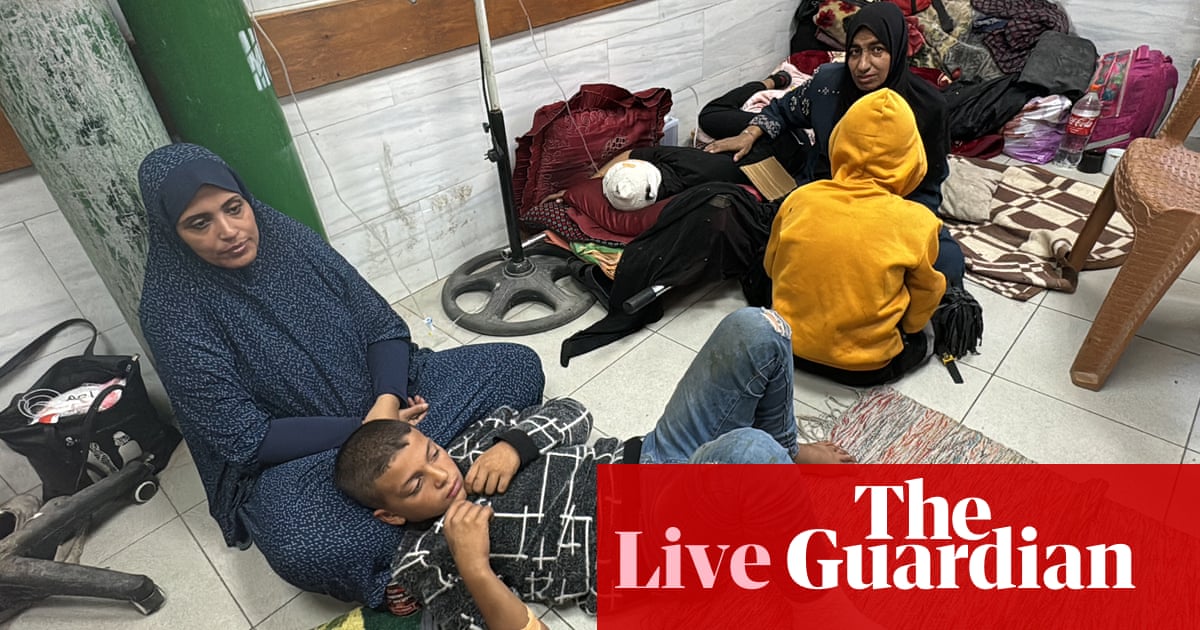UN rights chief says ‘darkest moment’ of Israel’s war on Gaza is unfolding in the north
The UN rights chief, Volker Turk, has issued a statement in which he describes Israelâs renewed assault on northern Gaza as the âdarkest momentâ of the year-long war on the territory so far.
He said:
Unimaginably, the situation is getting worse by the day. The Israeli governmentâs policies and practices in northern Gaza risk emptying the area of all Palestinians.
We are facing what could amount to atrocity crimes, including potentially extending to crimes against humanity.
Turk said âmore than 150,000 people are reportedly dead, wounded or missing in Gazaâ since the war was launched last October.
âMy gravest fear is, given the intensity, breadth, scale and blatant nature of the Israeli operation currently underway in North Gaza, that number will rise dramatically,â he said.
Israeli forces began the devastating offensive in the north about three weeks ago with the declared aim of preventing Hamas fighters from regrouping. Residents, however, say the troops have besieged shelters, levelled civilian infrastructure, forced displaced people to leave with nowhere safe to go, while killing many civilians in deadly airstrikes. Medics say at least 800 Palestinians have been killed in northern Gaza since the new offensive was launched.
Key events
Lebanon has been placed on financial crime watchlist, international body says
Lebanon has been placed on a so-called âgrey listâ of countries under special scrutiny by the Financial Action Task Force (FATF), the financial crime watchdog said on Friday, despite requests for leniency from Lebanese officials.
The FATF said Lebanon had made progress on several recommended actions and would continue to implement reforms, Reuters reported.
Lebanon has been in a financial crisis since 2019 and faces destruction from Israeli military operations against armed group Hezbollah. The grey-listing is likely to further deter investment and could affect the links between some Lebanese banks and the global financial system.
The international criminal court (ICC) on Friday said it would replace one of its judges on health grounds, in a move that could further delay a decision on the prosecutionâs request to issue an arrest warrant for Israeli prime minister Benjamin Netanyahu.
In May, prosecutors asked for warrants for Netanyahu and his defence minister Yoav Gallant as well as three Hamas leaders, saying there were reasonable grounds that the men had committed war crimes and crimes against humanity, Reuters reported.
The president of the ICC said the presiding judge in the case, Romanian magistrate Iulia Motoc, had asked to be replaced on health grounds on Friday and was immediately replaced with Slovenian ICC judge Beti Hohler.
The replacement is expected to further delay a decision on possible warrants in the case looking at the Gaza conflict as the new judge will need time to catch up on the filings.
The Israeli military said on Friday that three of its soldiers were killed in combat in northern Gaza Strip.
UN rights chief says ‘darkest moment’ of Israel’s war on Gaza is unfolding in the north
The UN rights chief, Volker Turk, has issued a statement in which he describes Israelâs renewed assault on northern Gaza as the âdarkest momentâ of the year-long war on the territory so far.
He said:
Unimaginably, the situation is getting worse by the day. The Israeli governmentâs policies and practices in northern Gaza risk emptying the area of all Palestinians.
We are facing what could amount to atrocity crimes, including potentially extending to crimes against humanity.
Turk said âmore than 150,000 people are reportedly dead, wounded or missing in Gazaâ since the war was launched last October.
âMy gravest fear is, given the intensity, breadth, scale and blatant nature of the Israeli operation currently underway in North Gaza, that number will rise dramatically,â he said.
Israeli forces began the devastating offensive in the north about three weeks ago with the declared aim of preventing Hamas fighters from regrouping. Residents, however, say the troops have besieged shelters, levelled civilian infrastructure, forced displaced people to leave with nowhere safe to go, while killing many civilians in deadly airstrikes. Medics say at least 800 Palestinians have been killed in northern Gaza since the new offensive was launched.
‘We stand at the brink of regional war’, Jordan’s foreign minister warns as Israeli attacks intensify

Patrick Wintour
Patrick Wintour is the Guardianâs diplomatic editor.
Jordanâs foreign minister, Ayman Safadi, has called for pressure on Israel to end âethnic cleansingâ, as he met US secretary of state Antony Blinken in London.
Blinken stopped over in London to brief leaders from Lebanon, the United Arab Emirates and Jordan after he had been unable to meet them on his recent tour of the Middle East. Blinken is still hoping the Gaza peace talks can be revived.
Deploring the humanitarian situation in northern Gaza, Safadi told Blinken: âWe do see ethnic cleansing taking place, and that has got to stop.â
He added:
We really stand at the brink of regional war now. The only path to save the region from that is for Israel to stop the aggressions on Gaza, on Lebanon, stop unilateral measures, illegal measures, in the West Bank, that is also pushing the situation to an abyss.
On 13 October, Blinken wrote jointly with the US defence secretary Lloyd Austin to Israel urging the country to increase the number of aid trucks entering Gaza to 350 per day within 30 days. But since then no day has seen the number of trucks exceed 114, whilst the number of trucks inside Gaza but unable to distribute aid has risen 470 to 700.
The amount of aid entering Gaza is at record low levels in October, and although Blinken in the Middle East claimed to have seen an improvement, Arab diplomatic sources said the figures are nowhere near the level the Biden administration previously said in its letter that would be required for the US administration to stop supplying Israel with arms.
Separately in talks with Lebanonâs caretaker prime minister Najib Mikati, Blinken said: âWe have a sense of real urgency in getting to a diplomatic resolution and the full implementation of UN security council resolution 1701, such that there can be real security along the border between Israel and Lebanon.â
He said it was important so âpeople at both sides of the border can have the confidence to be able to return to their homes.â
His remarks stop short of a call for an immediate ceasefire, the position adopted by the French since the US believes that if Hezbollah can be weakened further the political deadlock that prevents the formation of a full government can be broken.
Resolution 1701, approved in 2006 after an earlier war, calls for the disarmament of non-state groups in Lebanon â including to the Hezbollah group, which effectively runs its own armed militia â and for a full Israeli withdrawal from the country.
One precondition for a full implementation of 1701 is strengthening the official Lebanese armed forces. On Thursday, at a Paris Conference, the international community pledged to pay â¬200m to strengthen the Lebanese army, in particular by recruiting soldiers. A further â¬800m was raised to help the humanitarian crisis.
Mitaki said his governmentâs priority is reaching âa ceasefire and deterring the Israeli aggressionâ. He added there are more than 1.4 million people who have been displaced from the areas that are being attacked by Israel. âIsrael is also violating international law by attacking civilians, journalists and medical staff,â he said.
He said âwhat is required is a real commitment from Israel to a ceasefire, because the previous experience regarding the American-French call, supported by the Arabs and the international community, for a ceasefire affected everyoneâs credibility.â Mitaki was referring to a proposal for an initial 21-day truce agreed at the UN general assembly in the false belief that it had the support of the Israelis.
Israelâs military humanitarian unit, Cogat, which oversees aid and commercial shipments to Gaza, said earlier today it had allowed the transfer of 23 patients out of the Kamal Adwan hospital the previous night by Palestinian ambulances and UN vehicles.
Cogat said it had allowed the transfer of one fuel truck, â180 blood units and a truckload of medical equipmentâ donated by UN agencies.
Hundreds of patients and staff ‘detained’ at Kamal Adwan hospital after Israeli raid
In an earlier post, we referenced reports that Israeli troops surrounded Kamal Adwan hospital â the last functioning hospital in Gazaâs north â last night.
Gazaâs health ministry said hundreds of patients and staff have been detained in north Gazaâs last functioning hospital.
âIsraeli forces have stormed and are present inside Kamal Adwan Hospitalâ in the city of Jabalia, the ministry said in a statement.
âThey are detaining hundreds of patients, medical staff and some displaced individuals from neighbouring areas who sought refuge in the hospital from continuous bombardment,â it added.
The director general of the World Health Organization (WHO), Tedros Adhanom Ghebreyesus, said his staff have lost contact with personnel at the facility since reports of the Israeli raid surfaced this morning.
He described this as a âdeeply disturbingâ development as there were many injured patients being treated there and others sheltering from relentless Israeli bombardments in the area.
In a post on X, in which he reiterated calls for an immediate ceasefire, the WHO chief added:
Kamal Adwan hospital has been overflowing with close to 200 patients – a constant stream of horrific trauma cases.
It is also full of hundreds of people seeking shelter. Accessing hospitals across Gaza is getting unbelievably harder and exposes our staff to unnecessary danger.
Kamal Adwan has been struggling with shortages since the start of war, but these have been worsened by a renewed Israeli assault on northern Gaza in recent weeks that the IDF says was launched to stop the regrouping of Hamas fighters there.
âThere has been no supply or provision of food, medicine, or essential medical supplies needed to save the lives of the injured and sick in the hospital,â Gazaâs health ministry said, calling the situation inside âcatastrophic in every sense of the wordâ.
About 770 people have been killed in Jabalia, along with other parts of the Palestinian territoryâs north, since the offensive was launched on 6 October, Gazaâs civil defence reported.
âSince the start of operational activity in Jabalia, approximately 45,000 Palestinian civilians have evacuated, and IDF (Israeli army) troops have eliminated hundreds of terroristsâ, the Israeli military said.
At least nine Palestinians were killed and several were injured on Friday in an Israeli airstrike on Al-Shati, one of the Gaza Stripâs eight historic refugee camps, medics told Reuters.
Peacekeepers of the UN Interim Force in Lebanon withdrew from a observation post in Zahajra town in south Lebanon on Tuesday after Israeli forces fired at it, the force said on Friday.
The UN mission, known as Unifil, is stationed in southern Lebanon to monitor hostilities along the demarcation Blue Line with Israel â an area that has seen fierce clashes this month between Israeli troops and Iran-backed Hezbollah fighters.
The mission said that when Israeli soldiers conducting house-clearing operations nearby realised they were being observed they fired at the post, which prompted the duty guards to withdrew to avoid being shot.
It added that the Israeli military has repeatedly demanded that Unifil vacate its positions along the Blue Line and has deliberately damaged camera, lighting and communications equipment at some of these positions.
Here are some of the latest images coming out of Khan Younis, in southern Gaza, where Palestinian officials said Israeli military strikes have killed at least 38 people since Thursday night:
The Israeli military has confirmed reports that it had struck a border crossing between Syria and Lebanon that it claimed was being used by Hezbollah to transfer weapons.
The airstrike hit Hezbollah âinfrastructureâ at the Jousieh crossing (known as Qaa on the Lebanese side) in Lebanonâs northern Bekaa area overnight, the military said.
It said Hezbollah âexploits the Jousieh civilian crossing, which is under the control of the Syrian regime and is operated by Syrian military security, to transfer weaponsâ.
××××¡× ×§×¨× ×©× ××× ×××××ר, ×××××× ×ª ×××£ ××××××¢×× ×ª×§×¤× ××××× ××××× ×ª×©×ª××ת צ××××ת ×©× ×ר××× ××ר×ר ×××××××× ×××¢×ר ××××× ×׳×ס×× ×צפ×× ××קע×>> pic.twitter.com/klvzlajAtP
— צ×× ×××× × ××שר×× (@idfonline) October 25, 2024
Lebanonâs transport minister Ali Hamieh said earlier that the strike had knocked the crossing out of service. This means both Lebanonâs eastern crossings are closed, leaving the northern route as the only way to Syria.
The UN refugee agency, UNHCR, said the strikes were hindering refugeesâ attempts to flee. UNHCR spokesperson Rula Amin said about 430,000 people have crossed to Syria since Israelâs assault on the country started.
âThe attacks on the border crossings are a major concern,â Amin said. âThey are blocking the path to safety for people fleeing conflict.â
Lebanonâs prime minister, Najib Mikati, has reacted to the news that three journalists were killed in an Israeli airstrike in Hasbaya, south-eastern Lebanon, this morning (see post at 08.12 for more details).
In a statement, he said âthe new Israeli aggression targeting journalistsâ was among the âwar crimes committed by the Israeli enemyâ, adding that the attack was âdeliberateâ and âaims to terrorise the media to cover up crimes and destructionâ.
Those killed were camera operator Ghassan Najjar and engineer Mohamed Reda from Lebanese news channel Al Mayadeen, as well as camera operator Wissam Qassem from Al-Manar, another TV outlet.
Five journalists had been killed in prior Israeli airstrikes in Lebanon, according to the BBC.
Eid Sabbah, Kamal Adwan hospitalâs director of nursing, sent a voice note to Reuters, after Israeli forces stormed the facility.
âSince last night, at midnight, the occupation army tanks and bulldozers reached the hospital. The terrorising of civilians, the injured and children began as they (the Israeli army) started opening fire on the hospital,â Sabbah said.
He said when the army retreated, a delegation from the World Health Organisation arrived with an ambulance and evacuated 40 patients from the northern Gaza hospital.
But Israeli tanks returned and opened fire on the hospital, which has run out of medical supplies, striking its oxygen stores, before raiding the building and ordering staff and patients to leave, Sabbah told Reuters.
Summary of the day so far…
-
An Israeli airstrike killed at least three journalists and injured several others as they slept in guesthouses in southern Lebanon on Friday, Lebanonâs health ministry said, in what Lebanonâs information minister declared a war crime. The Israeli military has not yet commented on the attack.
-
Lebanonâs transport minister said Israeli bombing put a second border crossing between the country and Syria out of service – leaving one official passage between the two nations operational.
-
The US secretary of state, Antony Blinken, vowed to work with âreal urgencyâ for a diplomatic resolution to end Israelâs war on Lebanon, but did not call for an immediate ceasefire. Blinken is in London meeting Arab leaders, including Lebanese prime minister Najib Mikati, and Jordanâs foreign minister, Ayman Safadi, who told him: âWe do see ethnic cleansing taking place, and that has got to stop,â referring to Israelâs renewed assault on northern Gaza.
-
Northern Gazaâs Kamal Adwan hospital has now run out of medical supplies and the Israeli military is conducting mass arrests of men inside of the facility, Al Jazeera reported.
-
The Associated Press reported that 38 people were killed in Israeli attacks in the southern city of Khan Younis in Gaza overnight into Friday, citing health officials.
-
The Israeli army said five soldiers were killed and two others seriously injured in fighting in southern Lebanon.
Israeli attacks kill 38 Palestinian people overnight in Khan Younis – report
In an earlier post, we cited reporting from Palestinian news agency Wafa that said Israeli airstrikes on Khan Younis killed 28 civilians this morning. The Associated Press is reporting that 38 people were killed overnight into Friday, citing health officials.
Palestinians who were killed or injured were taken to the European and Nasser Hospitals. Records from the European hospital obtained by the AP showed at least 15 members from al-Farra family were killed, including 13 children.
Gaza Civil Defence spokesperson Mahmoud Bassal posted a video on Friday morning of rescuers recovering the bodies of 9 children from the al-Farra family in al-Manara neighborhood.
The Israeli attack, which included airstrikes and shelling, according to health officials, targeted several residential buildings in neighborhoods east of Khan Younis. Six members of the Abdeen family were also killed, according to health officials.
Israel must stop ‘ethnic cleansing’ in Gaza, Jordan foreign minister tells Antony Blinken
As we reported in an earlier post, the US secretary of state, Antony Blinken, has met with the Lebanese prime minister, Najib Mikati, in London, as efforts to bring about a diplomatic resolution to Israelâs war continue. Blinken also met with Jordanâs foreign minister, Ayman Safadi, who brought up the devastating Israeli offensive in northern Gaza, where many civilians have been killed and infrastructure levelled in an intense military siege by the Israeli military over recent weeks. Safadi told Blinken: âWe do see ethnic cleansing taking place, and that has got to stop.â
Blinken is in the UK meeting Arab leaders, following a diplomatic tour of the Middle East earlier this week, his first to the region since Israel killed Hamas leader Yahya Sinwar, suspected mastermind of the 7 October attack last year.
âWe have a sense of real urgency in getting to a diplomatic resolution and the full implementation of UN security council resolution 1701, such that there can be real security along border between Israel and Lebanon,â Blinken said. He was referring to the resolution that ended the 2006 Israel-Hezbollah war and has since been the framework that governs security dynamics on the Lebanese-Israeli border.
âMeanwhile, we want to make sure we want to see civilians protected. We want to make sure that Lebanese armed forces are not caught in the crossfire,â Blinken added.



